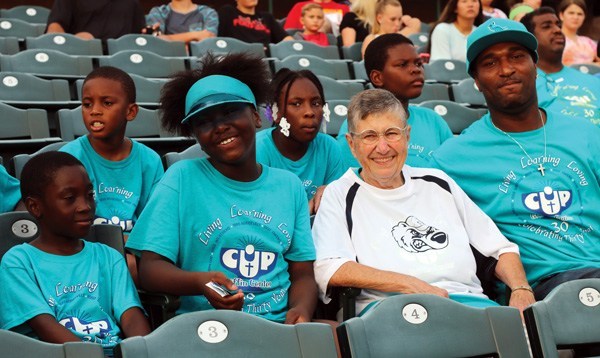By SUZANNE KOZIATEK
Contributing writer
Sister Julia Huiskamp has spent the past 60 years serving God and the poor, creating havens where people on the margins can build escape ladders out of poverty and violence.
But her path could have been a very different one. She started out as a reporter and photographer for The Daily Gate City, the newspaper in her hometown of Keokuk, Iowa. Sister Julia says she started to think differently about her journalistic career after her first front-page photo ran.
“It was a big deal to me,” she says. “But then my family was eating catfish one Friday night and my mother wrapped up the fish bones in the paper with my front page photo on it and put it in the garbage.
“I knew then that I wanted my work to be more lasting than that newspaper,” she says with a laugh.
That revelation eventually led Sister Julia to the Daughters of Charity, who had taught in the parochial schools in Keokuk. “I knew the sisters, and my mother was a Lady of Charity. I was attracted to their service to the poor.”
She started as a teacher, but later was allowed to pursue a master’s degree in social work at St. Louis University. From then on she would spend the rest of her religious life in programs that served the underprivileged.
Sister Julia was sent first to Chicago to work at Marillac House, a large multi-service Daughters of Charity agency on the city’s west side offering services to children and adults.
“I worked for 18 years in Chicago,” she says. “I did everything; I ended up running the place. I loved it. I hated leaving, but our order was looking for underserved places in our provincial area where there were lots of poor people and we could make a difference.”
The new location they chose was East St. Louis, and Sister Julia arrived in 1985 to find a very different situation than she had in Chicago. There was no large agency through which she could work.
“They told me to look around and see what you can find to do,” Sister Julia says. “That unnerved me, coming from a place with a big organizational structure.”
Meanwhile the East St. Louis Housing Authority, which ran public housing projects, was being taken over by the federal government, who cited fraud and poor living conditions.
But in a way, she says, the time was ripe for change.
“Social workers know that when big upheaval is happening, that’s the time to get involved.”
She was already working with Catholic Urban Programs, and approached the housing authority to ask to use a boarded-up community center at the Villa Griffin housing development.
“We got the idea that we could do some afterschool stuff, with kids,” she says. Sister Julia obtained money from the Daughters of Charity – and some from her own family – and got the building back in shape, opening it as the Griffin Center in the summer of 1986.
She started with a summer day camp serving 20-30 children, aided by a Vincentian seminarian from Ethiopia and two Neighborhood Youth Corps workers.
From there, the center’s programs grew. Sister Julia started after-school programs at the Griffin Center, and visited families of the children.
Educator Diane Sonneman came aboard and added academic programs.
After a drug lab in an apartment nearby was raided, they got permission to use the deserted apartment as a learning lab.
As word spread about the success of the Griffin Center, residents of other East St. Louis housing developments approached her to open satellite programs in their neighborhoods.
Now, the agency has five sites, offering recreational programs and academic assistance such as tutoring, homework help and computer training.
Relying almost entirely on donations, they provide shoes, uniforms and school supplies so that kids aren’t barred from school due to lack of material needs.
But Sister Julia says that practical, material support is only part of their mission.
“The other part is the social work part,” she says. “We teach children to respect each other, to settle things without a fight. Social skills. I don’t care how smart you are, you have to have those to get anywhere.”
Having retired as the director of the Griffin Center, Sister Julia still works on the financial and personnel records for the agency.
She continues to see clients, helping adults in ways both small and large. In her office on a recent afternoon, a woman comes by to repay a small loan to Sister Julia. The money doesn’t stay in her hands long – within a few minutes, two other visitors have come to ask for monetary help. “Easy come, easy go,” she jokes.
She says that while conditions on the streets of East St. Louis haven’t improved in the years she’s been here, the prospects of many of the children have.
“There used to be kids on the street during the school day till October, because they didn’t have clothes, uniforms to wear to school,” Sister Julia says. “Kids were dropping out, many kids didn’t graduate high school. Now we’ve got many kids looking at college, saying ‘Yes, that’s something I can do.’
“The most satisfying thing is when kids come back, and they’re doing well,” she says. “When they can look back and remember their experience here fondly.”
She says she has no plans to set aside her work.
“I don’t envision retiring to a life of bingo and watching Judge Judy,” she says. “As long as my health holds up, I’ll keep working.
“It’s a great life.”






